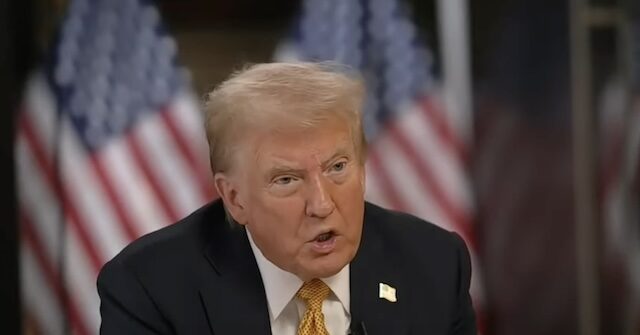President-elect Donald Trump’s appearance on NBC’s “Meet the Press” drew significant attention as he discussed his plans regarding the individuals involved in the January 6, 2021, Capitol riot. During the interview, host Kristen Welker questioned Trump about his intentions to fulfill his campaign promise to pardon those who participated in the attack, including over 900 individuals who have already pleaded guilty to various crimes linked to the incident. Trump’s response indicated a strong commitment to this course of action, suggesting he would evaluate individual cases but emphasizing that he plans to move swiftly in executing these pardons.
Trump highlighted the urgency of the matter, suggesting that many of these individuals had already spent considerable time in detention, pointing out that they have been incarcerated for “three or four years.” He expressed concern for their living conditions, referring to the places where they have been held as “filthy” and “disgusting.” This remark seemed to reflect a broader narrative he has promoted, positioning himself as a defender of those who follow him and portraying the consequences they faced as unjust. Notably, this approach aims to solidify his base of support by emphasizing a sense of loyalty to supporters who he believes were unfairly punished.
The conversation around pardoning these individuals is deeply intertwined with the political climate surrounding Trump’s presidency. Critics argue that pardoning those involved in an insurrection undermines the rule of law and sets a dangerous precedent regarding accountability and justice in the face of political violence. Trump’s supporters, meanwhile, may view the potential pardons as a necessary corrective to what they perceive as an overreach by the judicial system. This divide illustrates how the January 6 events have polarized political discourse in the United States, with Trump’s promises resonating strongly among his base while drawing ire from his adversaries.
Moreover, Trump’s indicated timeline shows an intention to act on the first day of his presidency, which aligns with his strategy of taking decisive action to mobilize his core supporters. By framing the pardons as an immediate priority, Trump reinforces an image of strength and decisiveness, critical elements of his political identity. This approach also serves to energize his supporters by addressing grievances they have about the treatment of those involved in the Capitol riot, portraying them as victims of a system unjustly targeting political dissent.
The implications of this potential mass pardon are complex. If Trump proceeds with these pardons, it may lead to further tensions between different factions within American society, raising questions about justice, accountability, and the legal ramifications of the insurrection. Moreover, such actions could deepen the divides within the Republican Party itself, presenting a challenge for party unity as members navigate the implications of endorsing or opposing Trump’s approach. Additionally, the pardons might evoke reactions from legal authorities and those who were directly affected by the events of January 6, resulting in an ongoing national conversation about the boundaries of presidential power.
In conclusion, Trump’s discussions on pardoning individuals involved in the January 6 riot encapsulate key themes of loyalty, justice, and political identity that define his presidency. His swift promise to carry out these pardons reflects a broader narrative he seeks to promote, one that appeals directly to his base while igniting controversy among opponents. As he prepares to take office, the potential consequences of such actions will reverberate through the political landscape, influencing not only the perception of Trump but also the broader national discourse surrounding accountability in the aftermath of political violence.

